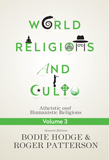
Why Ayaan Hirsi Ali No Longer Is an Atheist
Former atheist regrets mocking Christianity.
According to Christianity Today, at a recent Dissident Dialogues conference, Ayaan Hirsi Ali told prominent new atheist leader Richard Dawkins that she now regrets mocking Christianity. Ali, who had joined Richard Dawkins and Christopher Hitchens in the new atheist movement in condemning all religions as destructive, now thinks that Christianity alone has redeeming power in society and has embraced Christianity. Ali’s conversion to Christianity was a bombshell delivered in an article six months earlier.
But what is the nature of Ali’s conversion? I was curious, so I read her article “Why I Am Now a Christian” published last November. She began by recounting that in 2002 she had read the text of a lecture Bertrand Russell delivered in 1927 titled “Why I Am Not a Christian.” At the time, it never occurred to Ali that she would write an essay with a title opposite the title of the lecture Russell delivered to the National Secular Society in London nearly a century before.
Ali went on to explain her troubled past and how Russell’s lecture had helped her to make the transition from a nominal Muslim into an atheist 20 years ago. Ali was born into a Muslim society, so she experienced many bad things and was torn in different directions in the Muslim world as she and her family lived in different parts of Africa and the Middle East. The thing she feared most was eternal torment at the hands of an angry God. Once Ali made her way to the freedoms of the West, she encountered atheism for the first time, and she found the thought that there is no vengeful God very comforting, even if atheism didn’t exactly offer any hope either.
How Christianity Is Different
If we are to defeat these threats to Western society, we need an effective foundation to work from.
But Ali now calls herself a Christian. What changed? Ali had come to embrace Western civilization, but she eventually realized that the West is threatened by three forces: the resurgence and expansion of authoritarianism as exemplified by China and Russia, the rise of global Islam, and the spread of woke ideology. If we are to defeat these threats to Western society, we need an effective foundation to work from. Ali found that atheism and the rules-based new world order were insufficient to provide that foundation. She ultimately concluded that the only sure foundation to combat threats to the West is the Judeo-Christian tradition that produced the many freedoms that we enjoy in the West. Ali wrote:
Unlike Islam, Christianity outgrew its dogmatic stage. It became increasingly clear that Christ’s teaching implied not only a circumscribed role for religion as something separate from politics. It also implied compassion for the sinner and humility for the believer.
Ali also commented on atheism’s inability to address a fundamental question that everyone asks:
Atheism failed to answer a simple question: what is the meaning and purpose of life? Russell and other activist atheists believed that with the rejection of God we would enter an age of reason and intelligent humanism. But the ‘God hole’—the void left by the retreat of the church—has merely been filled by a jumble of irrational quasi-religious dogma.
The True Value of Christianity
Much of what Ali wrote is true, but it falls far short of the mark. Ali’s embrace of Christianity is merely pragmatic—the West is in an existential struggle, and recognizing the values of Christianity provides the most effective strategy for preserving all that we cherish in Western civilization. But nothing in Ali’s essay suggests that she grasps the objective reality upon which Christianity is based. Many people in the West accept Jesus Christ as a great moral teacher, but they dismiss as myth that Jesus is the Creator, performed miracles, or that he rose from the dead. The decline of the influence of Christianity in the West is a direct result of divorcing Christianity from the objective reality of who Jesus is, what he accomplished, and his Word. The enduring value of true Christianity is not in how it can save the West from its many threats today. Rather, the value of true Christianity is in how it transforms lives, providing hope to the hopeless, even if the West were to collapse.
Let us pray that as Ali continues to explore Christianity she truly finds the gospel. God created a sinless world, but man’s disobedience brought sin into the world, and death by sin (Romans 5:12). But in his love, God provided a way of salvation by sending his only Son, Jesus Christ, into the world (John 3:16). Jesus took the penalty of sin upon himself so that we can obtain eternal life through belief in him (Romans 12:18–19). Unlike Islam, true Christianity offers more than just eternal life—it enables us to live this life to its fullest while we share the love of God with others, in anticipation of the eternal life to come.
Recommended Resources

Answers in Genesis is an apologetics ministry, dedicated to helping Christians defend their faith and proclaim the good news of Jesus Christ.
- Customer Service 800.778.3390
- Available Monday–Friday | 9 AM–5 PM ET
- © 2026 Answers in Genesis





